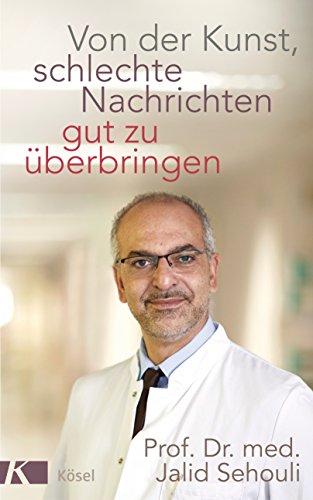SPIEGEL ONLINE: Mr Sehouli, how many the bearer of bad news to you on the day?
Sehouli: on average it is day three, but at least ten good news. A doctor performs in his work, and about 200,000 calls to live existentially-threatening situations with patients and relatives.
SPIEGEL ONLINE: What is bad news is you are particularly stuck in your memory?
Sehouli: at the Time I was a Student in the Practical year, and I have a Professor in his tour of the Station. We entered the room of a patient who was suffering from cancer of the stomach. The prognosis was hopeless. The Professor asked: do you Have a building loan contract? The patient replied: Yes. The doctor replied: Terminate.

SPIEGEL ONLINE: is it hard to believe.
Sehouli: something like this happens unfortunately often. Such behavior reflects the uncertainty of the physician. Instead of taking the words cancer and death in the mouth, it was for the Professor easier to make a detour and to convey the message about the topic of home loan and savings contract. The only Positive thing about this conversation was that the doctor has explained the Situation clearly. Not so brutal approach is, however, necessary. This can affect the whole course of a disease negative. Patients can lose their will to live, and even suicidal thoughts can develop.
SPIEGEL ONLINE: Doctors are expected to actually more empathy.
Sehouli: Yes, but there is a Problem. Doctors rarely get Feedback. You can ask bad after a conversation, as you have done so. You get and chocolates and a bouquet of flowers. And if it runs bad, sometimes a letter of complaint. But there is nothing in between. You can also go as a doctor in pension, to have without even a single training to communication. Doctors are often not trained.
SPIEGEL ONLINE: How can patients from such Doctors to protect?
Sehouli: not at all. You don’t know before the interview, how a doctor handles it. It is therefore important that patients prepare yourself well and know your needs. A big Problem is, for example, that patients often experience in the daily clinical routine between the door and the Angel, that the next day their findings will be discussed. Often you do not know, however, which is the specific time and place. There is a risk that they will be caught unawares the next day by the doctor.
SPIEGEL ONLINE: How can you prevent it?
Sehouli: The patient should make their wishes clear to Express. You want to have a family member, you should inform the doctor. You can also ask him to specify the time of the interview. If a Patient knows that the doctor is between 15 and 16 o’clock comes to him, he can prepare accordingly and also a relatives to ask. As patients gain more control.
Price query time:
02.05.2019, at 23:50
Without Guarantee

Product reviews are purely editorial and independent. The so-called Affiliate Links above we will receive when buying in the rule, a Commission from the dealer. More information can be found here.
SPIEGEL ONLINE: In what situations should patients call be prepared?
Sehouli: the Fact that the doctor talks to much. Doctors save themselves in monologues, when it comes to bad news. But this is exactly the Wrong thing. Patients can listen to after Delivering a dire message to a maximum of two and a half minutes. This is like a Flash. You smell, see, hear and feel then nothing more. The doctor should be to take out therefore speed.
SPIEGEL ONLINE: And silence?
Sehouli: Right, Doctors need silence to be able to put. But there are studies that show that Doctors can only have a maximum of 16 seconds. Then they talk more. But silence felt by many people as beneficial. And the only way you can process the message. If you do not, evaluate your situation, maybe completely wrong. I’ve experienced that patients were married on the day of her death still have hope, because the Doctors have not managed to describe your situation clearly.
SPIEGEL ONLINE: silence, endure, speed, take out, be empathetic and communicate – has a doctor ever time?
Sehouli: No time is no excuse. A good conversation does not depend on whether it takes five minutes or 20. It’s all about the attitude of the doctor. His mindfulness. He must make it clear to the patient: Yes, that is bad news. But now that I am here for you. And I’m not running also. And a doctor must ask the right questions: Who will take care of you? Who picks you up? It is not enough to tell the patient that he can report to if you have questions.
SPIEGEL ONLINE: Physicians should mindfully and be empathetic to the stresses of hospital life routinely master, easy and quick to operate and also the bureaucracy to cope with. Is not required all too much?
Sehouli: Yes, absolutely. Doctors do an insane workload. The tasks are banal, then again, existential. And everything changes rapidly. At the same time, Doctors are also just people who are afraid to talk about illness and death. And with all this you are left largely alone.
SPIEGEL ONLINE: do you Have suggestions?
Sehouli: Doctors should be your entire professional life on a regular basis for communication training to participate. Such seminars have been established at all universities and to the compulsory program. It would also be useful, Lead to reward such heavy conversations are appropriate. It can’t be that a difficult conversation with the Deliver a bad message is less rewarded than a simple technical investigation.





